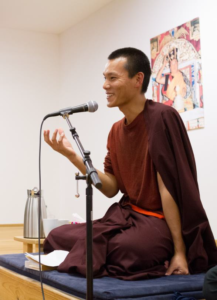Acharya Tenzing Wangpo, Belgrade, March 7-9

Mindfulness practice has deep roots in the Buddhist tradition. More than 2,600 years ago, the Buddha instructed his older disciples, the monks, to pass on these teachings to others and to practice their disciples in the Four Foundations of Conscious Attention. “Why?” They asked him.
“Come friends,” replied the Buddha. “Stay contemplating body to body, committed, clearly understanding, focused, with a concentration of mind focused on one point, to know the body as it really is. Contemplate mind in the mind … to know the mind as it really is. Stay contemplating phenomena in phenomena … to know what they really are.”
The practice of contemplation (or as we would say – meditating on …) The four basics – body, feelings, mind and phenomena – are recommended for people at all levels of the spiritual path. As the Buddha explained, this applies to all practitioners who have recently become interested in the Buddhist path, monks and nuns, even archates, advanced meditators who have already freed themselves from suffering.
Translated from the text “The Four Basics of Conscious Attention” published in Lion’s Roar by Bhante Henepol Gunaratan
Teacher
Tenzing Wangpo was born in 1990 in India into a Buddhist family. From the age of 7, he lived in a monastery where he acquired a thorough knowledge of the practices and teachings of Tibetan Buddhism. At the age of 12, he continued his education at Divakar Buddhist Academy, where he studied Indo-Tibetan Buddhist philosophy and literature as well as English and Hindi for eight years. Since graduating as Acharya, a highly educated expert and practitioner of Buddhist studies, he himself has become a lecturer at Divakar Academy and holds lectures in India and Europe.
Schedule
Saturday, March 7 gathering is at 9:30 a.m.
10,00-11,30 – first lecture session
11.30 – 12.00 – break
12.00 – 13.30 – Second session of the lecture
13.30 – 15.30 – lunch break
3.30 – 5.00 pm – Third session of the lecture
5pm – 6pm – private interviews
Sunday March 8, gathering is at 9:30 a.m.
11.30 – 12.00 – break
12.00 – 13.30 – Second session of the lecture
13.30 – 15.30 – lunch break
3.30 – 5.00 pm – Third session of the lecture
Monday March 9th – gathering is 6:30 pm
7 pm-9 pm Lecture
Location
Budmanijeva 17, at Zvezdara. It is a street parallel to King Alexander Boulevard, above the Kluz factory. The street is entered from the street Mite Ruzic. Trams 5, 6, 7, 14 depart from the city, getting off at the penultimate station. Bus 79 (from May 25 pool) – 2. Station after Cvetkova market. There is a bus 46 from the train station.
Costs and payment
For those who attend the whole course the price is 4,500 dinars in total. Individual lectures, if you are not able to attend the whole course: on Friday 700 dinars, on Saturday and Sunday 2000 dinars.
For students are free of charge
Important: Anyone who is unable to pay the full amount should mention, as payment in installments is possible. Payment is necessary to cover the cost of travel and accommodation for teachers. Lack of money is not a reason for not attending classes.
Donation
The value of Buddhist teachings is immeasurable.
Our teachers are making an unselfish effort and effort to impart these valuable teachings and help us along the path of spiritual awakening. To the best of our ability, we thank them for their donation, the expression of our generosity, the first of the six paramites that are the foundation of the enlightened mind.
Notes
Due to the limited number of places, be sure to announce your arrival. The center has zafu meditation pillows, you do not have to carry yours, but if you need a chair – let us know in due time because the number of seats is limited.
Apply as soon as possible. You can send your application and request for additional information to: info@bodhipath.rs or call 064 1674187.
The Buddha’s teachings are preserved in a continuous line of transmission, part of which is Karma Kagju – one of the four schools of Tibetan Buddhism.
The Bodhi Path Center was founded by Shamar Rinpoche, who along with Gjalva Karmapa was the holder of the Karma Kagju lineage. Under the spiritual guidance of Karmapa and Shamarpa, Bodhi Path teachers provide meditative and philosophical instruction to anyone interested in learning and practicing Buddhism.
Learning and Practice Curriculum
The Bodhi Path provides a curriculum of learning and meditative practices designed by Shamar Rinpoche, rooted in authentic Buddhist teachings and adapted to the needs and living conditions of contemporary practitioners.
This curriculum is taught in all Bodhi Path Centers and can be accessed based on the instructions of a qualified teacher.
Shamar Rinpoche (1952 – 2014)
Mipam Chokji Lodro was born in 1952 in Tibet. When he was fourteen in the XVI Gjalva Karmapa, the holder of the Kagju line of Tibetan Buddhism recognized him as XIV Shamarpa. The Shamarpa is Red Hat Lama, the line it was created in the 13th century and represents the second oldest continuous lineage of incarnations and transmissions of Kagju teachings and holders of the lineage. Shamar Rinpoche remained with the XVI Gjalva Karmapa until his death in 1981 and received a full transmission of teachings from him. Since 1980, he has taught at various Buddhist centers across Asia and the West. In 1996, he began to establish the Bodhi Path Buddhist Centers, that is, a network of centers based on a non-sectarian approach to Buddhism. The Bodhi Path Centers curriculum is based on the teachings of mind training (lojong) originating from the nineteenth-century Indian Buddhist teacher Atisha. The Atisha methods are especially practical and effective for practicing the mind and deepening the wisdom in our modern age, and in addition can be transmitted and applied outside the monastic framework.
www.bodhipath.org www.bodhipath.rs